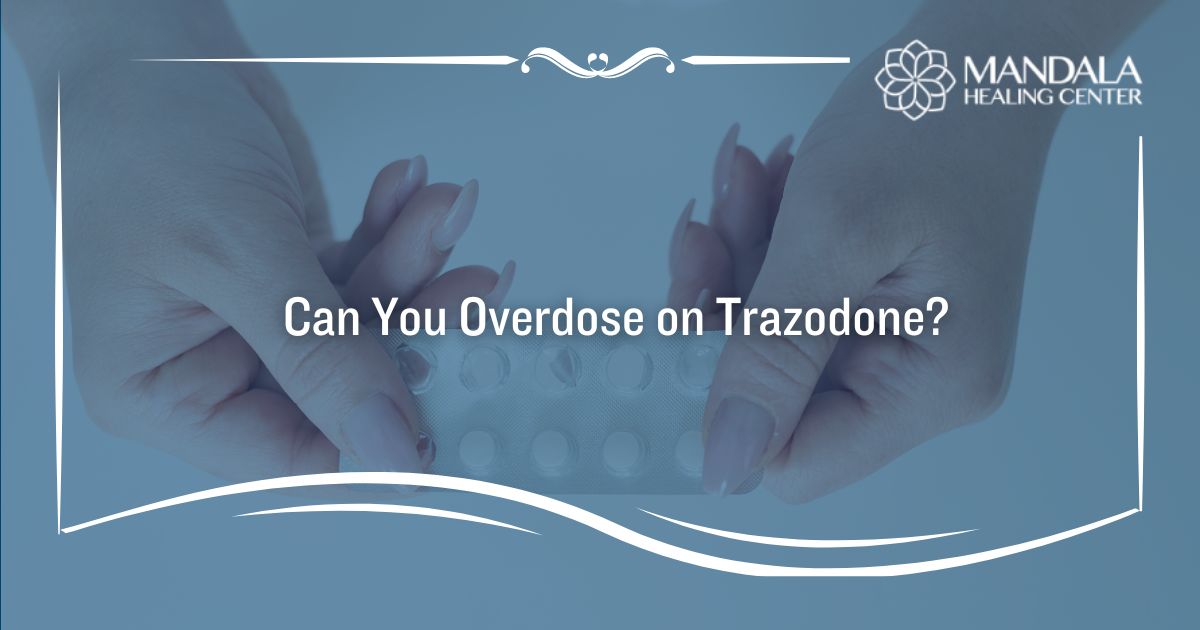Depression is one of the most common mental health conditions in the world. According to the World Health Organization, 280 million people across the globe struggle with depression.[1]
While depression requires therapy to recover, many people also need prescription medications to manage the chemical imbalances caused by depressive disorders. Many different medications can treat depression, with most of them being considered generally safe to consume long-term.
A common medication for individuals suffering from depression, insomnia, and anxiety is trazodone. Trazodone is a serotonin antagonist and reuptake inhibitor (SARI) and is also considered an atypical antidepressant.
When taken as prescribed, trazodone does not cause mind-altering effects or dependency. That being said, some people might attempt to experience a high by combining trazodone with other substances like alcohol or opioids or by taking large amounts of trazodone at once. Unfortunately, doing so can lead to an overdose.
While trazodone overdoses are not usually life-threatening, they always require medical attention.
In this article, you will learn:
- What trazodone is
- What side effects does trazodone cause
- Whether trazodone is addictive
- Whether you can overdose on trazodone
- What are the signs of a trazodone overdose
What is Trazodone?
Trazodone is an antidepressant medication that can be used for a variety of purposes. For example, doctors may prescribe trazodone to manage depression, insomnia, anxiety, or even eating disorders like bulimia. Because of its low potential for abuse, trazodone is considered a Schedule V drug in the United States.
By increasing levels of serotonin and norepinephrine in your brain, trazodone can treat major depressive disorder and a variety of other conditions. It is also helpful in managing insomnia because it is considered a central nervous system depressant, which means it causes side effects like drowsiness.
The side effects of trazodone may include:[2]
- Nausea and vomiting
- Diarrhea or constipation
- Changes in appetite and weight
- Weakness or fatigue
- Nervousness
- Dizziness and lightheadedness
- Nightmares or sleep disturbances
- Muscle pain
- Dry mouth
- Stuffy nose
- Tired, red, or itchy eyes
In severe cases, trazodone can lead to prolonged and painful erections. If you experience this side effect, you should seek medical attention as soon as possible.
Is Trazodone Addictive?
As mentioned, trazodone has a low potential for abuse. However, that does not mean it is impossible to misuse it. If you have a history of substance abuse, you might be more likely to begin abusing your trazodone.
Since trazodone can cause symptoms of drowsiness, you might be tempted to take it in large doses. It is also common for people to combine it with other substances like alcohol or opioids to experience a more potent high.
If you are abusing trazodone, it is possible to become addicted. Over time, you will develop a dependence on trazodone that can lead to withdrawal symptoms if you stop using it.
The withdrawal symptoms associated with trazodone include:
- Rapid mood swings
- Hypomania
- Irritability and anxiety
- Agitation and confusion
- Insomnia
- Dizziness and lethargy
- Headaches
- Ringing in the ears and blurry vision
- Nausea or vomiting
- Excessive sweating
- Seizures
If you or a loved one suffers from an addiction to trazodone, you should seek help from a drug rehab center. Taking too much trazodone at once could lead to serotonin syndrome or an overdose. Receiving care for your substance use disorder will prevent these health complications from occurring.
Can You Overdose on Trazodone?
It is possible to overdose on trazodone, however, you’d have to take an extremely large dose. The maximum daily dose of trazodone is 300mg, but overdoses generally do not occur unless you take 2000mg at once.[3]
You can overdose on a smaller dose of trazodone if you are mixing it with other substances. You might be tempted to drink alcohol or abuse other prescription drugs like opioids or benzodiazepines while you are on trazodone. Unfortunately, doing so could lead to a life-threatening overdose.
If you believe someone is overdosing on trazodone, you should call the poison control center and emergency medical services immediately.
Signs of a Trazodone Overdose
Research explains that “trazodone overdoses are often associated with central nervous system depression, serotonin syndrome, and cardiac dysrhythmias.”[3]
If you notice a friend or loved one displaying the following symptoms, contact 911 immediately:[4]
- Difficulty or stopped breathing
- Irregular heartbeat and chest pain
- Low blood pressure and fainting
- Slowed or stopped heartbeat
- Dizziness and drowsiness
- Lack of coordination
- Tremors or shaking
- Seizures
- Loss of consciousness or coma
Trazodone overdoses can include severe symptoms like seizures and coma, so you should always call for help as soon as you notice someone displaying the signs.
Get Connected to a Drug and Alcohol Rehab Center
If you or a loved one suffers from an addiction to trazodone or another type of drug, the Mandala Healing Center is here to help. We offer evidence-based treatments for addiction, giving you the best shot at long-term recovery possible.
Contact us today for more information on our drug and alcohol rehab program.
References:
- The World Health Organization (WHO): Depressive disorder (depression)
- Medline Plus: Trazodone
- The National Library of Medicine (NLM): Management of Trazodone Overdose with Severe Hypotension
- Medline Plus: Trazodone overdose












